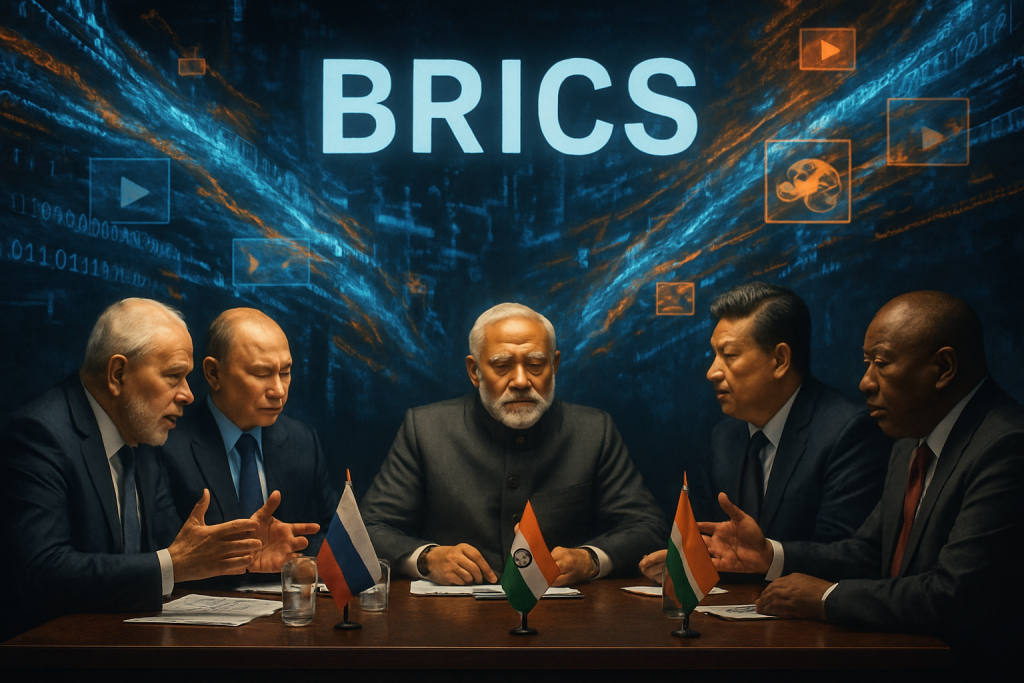Rio de Janeiro, July 6, 2025. The sun beat down on the summit, but inside, a different kind of heat was rising: the heat of global powers grappling with the wild west that artificial intelligence has become. The BRICS nations- Brazil, Russia, India, China, and South Africa- have just dropped a bombshell, demanding enhanced protections against the unauthorized use of AI. Forget the samba; this is a serious power play that could reshape the future of AI development and deployment.
Think of it as the AI equivalent of Napster, but instead of Metallica freaking out about pirated music, it’s entire nations concerned about their data being vacuumed up and monetized without their consent. And just like the music industry had to reckon with the digital revolution, Big Tech is about to face a reckoning of its own.
But why now? What’s behind this sudden surge of regulatory zeal? To understand, you need to rewind a bit. For years, the BRICS nations have watched with growing unease as tech giants, primarily based in the West, have amassed colossal datasets, often using copyrighted material to train their AI models. The argument? “Fair use,” a concept that’s become increasingly stretched thinner than that last slice of pizza at a tech conference.
The BRICS nations feel like they’re being asked to foot the bill for the AI party, providing the data, the content, the creative input, while getting none of the cake. They see themselves as digital sharecroppers, tilling the fields of data only to have the harvest snatched away by Silicon Valley landlords. And they’re not happy about it.
The Rio summit was the culmination of years of simmering frustration. According to a leaked draft statement, the BRICS leaders are laser-focused on two key areas: preventing excessive data collection and ensuring fair compensation for content creators. Let’s break that down.
Preventing excessive data collection is about more than just privacy. It’s about national data sovereignty. Imagine a scenario where an AI system, trained on data scraped from across the BRICS nations, becomes a powerful tool for surveillance or economic manipulation. That’s a nightmare scenario for these countries, and they’re determined to prevent it. They want to build a digital wall, protecting their citizens’ information from being exploited by external forces.
Ensuring fair compensation is equally crucial. Think about it: AI models learn from vast amounts of text, images, music, and video. Much of that content is created by artists, writers, and musicians who deserve to be compensated for their work. The BRICS nations argue that AI companies shouldn’t be able to build trillion-dollar empires on the backs of unpaid creators. It’s about basic fairness and economic justice. No more “Hey Jude” without paying the Beatles their due, even if a robot is learning the chords.
So, what are the immediate implications of this announcement? Well, expect a lot of lobbying. Big Tech isn’t going to give up its data advantage without a fight. We’re likely to see a flurry of legal challenges, public relations campaigns, and attempts to water down any proposed regulations. It’s going to be a messy, drawn-out battle, a digital version of the Cold War.
But the long-term consequences could be even more profound. If the BRICS nations succeed in establishing these protections, it could set a new global standard for AI governance. Other countries might follow suit, leading to a more fragmented and regulated AI landscape. This could slow down the pace of AI innovation, but it could also lead to more ethical and sustainable development.
The companies most affected will undoubtedly be the AI giants: Google, Microsoft, Amazon, and the like. They’ll need to rethink their data collection strategies and potentially negotiate licensing agreements with content creators. This could significantly increase their costs and reduce their profit margins. It might even force them to develop new AI models that are less reliant on massive datasets. Imagine AI development moving from a data-hogging monster to a lean, mean, algorithm-machine. That’s the potential future.
But it’s not just the tech companies that will be impacted. Content creators could see a new revenue stream, as their work becomes more valuable in the age of AI. The creative industries could experience a renaissance, as artists and writers are finally recognized and rewarded for their contributions to the AI ecosystem. We might even see a new generation of AI-powered tools that are designed to be fair and equitable.
Of course, there are also political and societal implications. The BRICS nations’ stance on AI reflects a broader trend towards multipolarity in the global order. They’re challenging the dominance of the West and asserting their own vision for the future of technology. This could lead to a more balanced and equitable world, but it could also create new tensions and conflicts.
And then there are the philosophical and ethical considerations. This whole debate raises fundamental questions about the nature of creativity, the value of data, and the role of AI in society. Are we building a future where AI serves humanity, or are we building a future where humanity serves AI? The answer to that question will depend on the choices we make today.
Finally, let’s talk about the financial and economic impact. The BRICS nations’ call for data protections could trigger a significant shift in the AI market. Companies that are willing to comply with these regulations could gain a competitive advantage, while those that resist could face boycotts and sanctions. The AI industry could become more decentralized and diversified, as new players emerge to challenge the dominance of the tech giants.
The bottom line? The BRICS nations’ announcement is a watershed moment in the global discourse on AI governance. It’s a wake-up call for Big Tech, a challenge to the status quo, and a reminder that technology should serve humanity, not the other way around. The genie is out of the bottle, but it’s up to us to decide how to tame it. The future of AI is being written right now, and the BRICS nations are determined to have a say in the story.
Discover more from Just Buzz
Subscribe to get the latest posts sent to your email.


